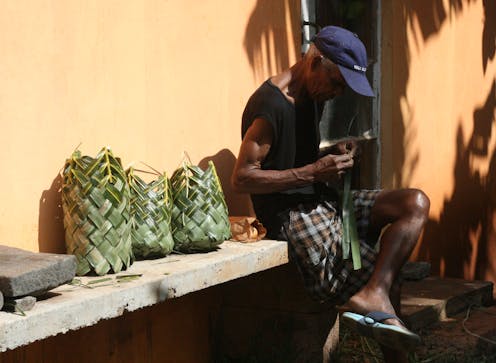
After years of negotiations and legal pressure, the UK and the Republic of Mauritius have agreed that Mauritius is sovereign over the Chagos Archipelago.
The Chagos Archipelago is a group of seven coral atolls which comprise more than 60 islands in the Indian Ocean. In 1965, as part of negotiations leading to Mauritian independence, the UK government excised the Chagos Archipelago from colonial Mauritius. The UK kept the islands, which are in a globally strategic location, to make the island of Diego Garcia available to the US military for 50 years, later extended by 20 years.
The islands have been the subject of a diplomatic dispute for decades, with Mauritius maintaining its sovereignty and arguing it was illegally forced to give the archipelago away in exchange for independence.
Read more: UK hands Chagos Islands to Mauritius, marking the end of a longstanding sovereignty dispute
Under the new political agreement, the UK will provide financial support to Mauritius, including a new trust fund for displaced Chagossians. Mauritius will be able to resettle the Chagos islands, other than Diego Garcia. This island will remain the site of a US-UK military facility for at least 99 years.
This is a significant moment for decolonisation (albeit incomplete), and potentially a landmark moment for the displaced Chagossian community. Decades after being forcibly exiled, they may finally be able to resettle on some of the Chagos islands.
Who are the Chagossians?
The Chagos Archipelago was unpopulated before European expansion in the Indian Ocean, when it was administered as a dependency of colonial Mauritius. French, and later British, colonists populated the islands. This took place first with enslaved labourers, mostly from east Africa and Madagascar via Mauritius, and later with contract workers, mostly from India via Mauritius.
The economy relied on coconut plantations, which became central to Chagossian culture. Coconut features in Chagossian cuisine, handicrafts and song.
The population of the Chagos islands rose over the 19th century. It hovered around 1,000 in the first half of the 20th century.
At the request of the US, the UK authorities depopulated the Chagos Archipelago to make way for the military base. From 1967 to 1973, they forcibly evicted more than 1,500 islanders to Mauritius and Seychelles.
They did this first by preventing the return of islanders who had gone on trips to Mauritius and Seychelles. Later, they restricted supplies and wound down work on coconut plantations. Finally, they coerced the remaining islanders onto crowded ships.
Read more: How the US and UK worked together to recolonise the Chagos Islands and evict Chagossians
By 1973, between 1,328 and 1,522 Chagos islanders had been relocated to Mauritius, and 232 to Seychelles. Their forced displacement led to further economic, psychological and cultural harms.
The British Overseas Territories Act 2002 and the Nationality and Borders Act 2022 awarded UK citizenship to Chagos islanders and their descendants born in exile. Today, several thousand members of the extended Chagossian community live in the UK, while many still live in Mauritius and Seychelles.
Since 2002, I have conducted anthropological research with the extended and geographically dispersed Chagossian communities. I have witnessed their chronic marginalisation firsthand.
My research has studied how members of this dispersed and fractured community have sustained their relationships to Chagos through shared cultural practices.
One example of this is through music. Chagossian sega songs composed on Chagos paint a nuanced picture of the complexities and turbulence of colonial plantation life. Lyrics protest unfavourable social, political, and economic conditions. They lament personal suffering, depict joyful occasions, or jest via suggestive double entendres.
Meanwhile, sega songs are now also composed in exile. They contrast depictions of the island as an idyllic paradise, with the community’s subsequent experiences of displacement, dislocation and loss.
These cultural practices have brought the exiled Chagossian community together, and served as a vehicle for cultural and political mobilisation. They have also, I argue, drawn attention to the Chagossian cause from outside communities.
Resettlement
Chagossian activists have long campaigned for compensation for their forcible displacement and their legal right of return. They secured limited compensation from the UK government in 1978 and 1982. But they have not yet achieved resettlement in practice.
It is not yet clear whether displaced Chagossians will be able to return to the islands under the new agreement.
Members of the Chagossian community hold differing opinions about resettlement and sovereignty. Some are hopeful that the Mauritian government will facilitate resettlement: something the UK refused to do.
Some Mauritian citizens and Chagos islanders from Diego Garcia are critical of the exclusion of Diego Garcia from the agreement. And many Chagossians are worried that Mauritius might prioritise the interests of Mauritian citizens over non-citizens, or that it might prioritise its economic and military interests over resettlement.
Many Chagossians are concerned that the negotiations involved representatives of the two governments, but not of the displaced Chagossian community.
The political agreement is subject to the finalisation of a treaty and supporting legal documents. This means there is still time for the governments to involve Chagossians in the conversation.
Laura Jeffery has previously received funding for Chagos research from the UK Economic and Social Research Council (ESRC) and the UK Arts and Humanities Research Council (AHRC).
This article was originally published on The Conversation. Read the original article.







